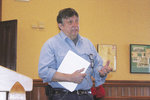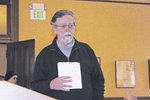The Port Townsend City Council canceled a special business meeting set for Feb. 27 to vote on a “sanctuary city” resolution, after an ad hoc committee consisting of half the council decided it …
This item is available in full to subscribers.
We have recently launched a new and improved website. To continue reading, you will need to either log into your subscriber account, or purchase a new subscription.
If you had an active account on our previous website, then you have an account here. Simply reset your password to regain access to your account.
If you did not have an account on our previous website, but are a current print subscriber, click here to set up your website account.
Otherwise, click here to view your options for subscribing.
* Having trouble? Call our circulation department at 360-385-2900, or email our support.
Please log in to continue |
|



The Port Townsend City Council canceled a special business meeting set for Feb. 27 to vote on a “sanctuary city” resolution, after an ad hoc committee consisting of half the council decided it needed at least one more meeting to hash out the resolution.
The ad hoc committee’s next meeting is scheduled for 1:30 p.m., Friday, March 3 in the City Hall’s second-floor council chambers at 540 Water St.
A new date for a vote before the City Council has not yet been selected.
COMMUNITY SPEAKS, AGAIN
The ad hoc committee’s Feb. 23 meeting drew 15 attendees from throughout the community with about a dozen more circulating through over the course of the discussion. Nine people were given time to speak at the start, with four more stepping up after the committee made plans to meet again March 3.
Aba Kiser and Suzanne Rodgers wondered aloud how such a resolution could impact the city’s federal funding, and Kiser recommended the council consult immigration lawyer Annie Benson – who addressed the council Feb. 13 and the Quimper Unitarian Universalist Fellowship Feb. 20 – to help it remain within the letter of the law for such funding.
“Also, if a majority-white group doesn’t consult with members of the marginalized communities that would be most affected by their decisions, that could be seen as paternalistic,” Kiser said. “And I say this as a white person myself.”
Karma Tenzing Wangchuk recalled that another speaker on Feb. 13 had questioned the council’s priorities by citing the plight of homeless veterans.
“I just wanted to say that I’ve been a homeless Vietnam veteran, so I did not want him speaking for me,” Wangchuk said.
David Berrian noted that the meeting’s attendees hadn’t had a chance to read the latest draft of the resolution before they arrived, but he nonetheless offered a few recommendations for its text. He hoped to see the resolution address President Donald Trump’s executive order on immigration directly.
Berrian called upon Port Townsend to pledge its support for fellow “sanctuary jurisdictions,” and to promise to protect any peaceful protesters who might be targeted by the Trump administration.
And in response to expressed concerns about how many immigrants might be criminals, Berrian called for language to be included that would “recognize the contributions of all our community members.”
Heather McRae-Woolf recounted the time her family helped undocumented immigrants from El Salvador when they were in Michigan during the 1980s.
“As a teenager, I would take their families’ teens around to the schools,” McRae-Woolf said. “It was a very powerful experience for me, and I’d love it if my daughter could know that she lives in a community that values these people.”
Hannah Russell, a white English immigrant who wore a “Black Lives Matter” pin, dealt with her own anxiety about deportation, as a nonviolent protester of nuclear weapons.
“[President] Reagan had deported other English immigrants who had protested for the same reasons as me,” Russell said. “I suffered from a similar sense of fear as today’s undocumented immigrants, about being separate from my family in America.”
Russell pointed out that the language of the Jefferson County Jail’s contract with the county does not prohibit agents of the jail from voluntarily cooperating with the departments of U.S. Customs & Border Protection or Immigration & Customs Enforcement (ICE).
Barbara Morey referred to the Indochina Migration and Refugee Assistance Act, passed in 1975 under President Gerald Ford, as an example of how fostering immigration yielded benefits for America.
“When people were displaced by the wars in Vietnam and Cambodia, we had structured programs in the 1970s that taught them English and provided them with housing,” Morey said. “What we received in return was one of the most productive, successful populations in America.”
By contrast, Morey remembers Central American refugees receiving sanctuary in churches and houses, a measure she hoped would never be necessary again.
Fred Nussbaum and his parents emigrated from Europe in 1957, after his parents survived the Holocaust and refused to return to Germany. He voiced his preference for the language of Olympia’s sanctuary city resolution, and felt it was important that Port Townsend do more than just respond to Trump.
A NOTE OF DISSENT
Jeff Gallant sounded the only note of dissent to a sanctuary city resolution, albeit while still expressing sympathy for those whom it’s intended to protect.
“Whether you call them illegal immigrants or undocumented workers, I like these people,” Gallant said. “They’re good, hard-working people who want the same things from life that we do. But I am still against illegal immigration. It’s hard to reconcile, being for the people but against the process by which they’ve come here.”
While Gallant expressed the desire to “raise these people out of the culture of illegality,” and even compared it to the legalization of marijuana, he nonetheless does not believe that governments should provide sanctuary to those who have come to this country illegally.
MANAGER’S, COUNCIL’S TAKE
“I found out the reason we were listed as a sanctuary city online,” Port Townsend City Manager David Timmons said. “It had nothing to do with any resolutions we’d passed. The site in question looked at the policies in place at each jurisdiction’s jail. The Jefferson County Jail doesn’t detain inmates due to their immigration status unless it’s received a federal warrant.”
After discussions with City Attorney Steven Gross, Timmons concluded that Port Townsend needs to issue not only a resolution, to clarify the city’s existing policies toward undocumented immigrants and other marginalized groups, but also a proclamation to serve as a statement of the city’s values of inclusion.
“We need to clarify how we operate, in part by restating the council’s prior actions,” Timmons said. “It’s my understanding that we’re not under threat of losing our federal funding, because we’re not violating federal statutes with our current policies.”
Gross responded to questions by Michelle Sandoval, City Council and ad hoc committee member, informing her that:
• The jail’s contracts with the city and county do not specifically address the immigration status issue.
• Russell was correct, and federal law prohibits the city or country from preventing agents of the jail from following federal laws by working with the Border Patrol or ICE.
• The Supreme Court’s rulings in regard to the Affordable Care Act – also known as Obamacare – would indicate that the 10th Amendment does not allow the federal government to force local governments to administer federal laws, nor can the federal government withhold funding for unrelated programs (although the federal government can exert an indirect influence).
“We have to comply with a federal criminal warrant, but not an administrative one,” Gross said.
Sandoval then suggested calling for a single resolution, rather than a two-part document, which would do more than merely codify existing policy.
“If all of this was already stated in a different way in December, why are we doing this all over again?” Sandoval said. “We issue a different proclamation just about every week. We’re living through history right now. We need to make a strong stance.”
Fellow council and committee member David Faber likewise called for a statement that would outline concrete steps to take next.
“We need to thread the needle between taking action and not stepping over the line that would put us in violation of federal law,” Faber said.
When Timmons cited a similar need for balance between offering a broader statement of values and “not imposing our own values upon individuals, because we can ask members of the community to share these values, but we can’t mandate or dictate them,” Sandoval took issue with his characterization of the issue.
“We’re taking a stand, not taking a side,” Sandoval said. “We’re not discriminating against those who disagree with us. We’re looking to protect the whole community, and that means everyone, even those who don’t share our belief systems. Beyond that, if one side wants to discriminate, that’s simply not lawful.”
UNANIMOUS SUPPORT
Sandoval’s motion that the resolution should address policy, law and value concerns was seconded by fellow council and committee member Amy Howard, before the committee approved it unanimously.
Beyond that, specifics were few and far between during the remainder of the discussion, as Faber laughingly acknowledged the internal conflict in his own stance, as “a bleeding-heart liberal who’s now arguing on behalf of states’ rights.”
Given that no legally binding definition yet exists for a “sanctuary city,” Timmons suggested specifying Port Townsend’s own definition within the resolution.
When Gross asked how reactive they wanted to be to future actions by the federal government, Faber preferred not to respond to specific executive orders.
“By offering broader protections to LGBTQ, Muslims and others, we can hopefully preempt what are likely to be a number of executive orders to come,” Sandoval agreed. “We’ve got four more years of this to look forward to.”
At the same time, all the city officials in attendance admitted to the limits of their powers.
“There are people who think this declaration will stop the federal government, but we do not have that power,” Sandoval said. “If they have a warrant, they have the power. It’s when they do things unlawfully, like when they set up checkpoints in 2008, that it matters. We should say that we are not advocating breaking federal law.”
“You don’t really find out if what you’ve passed is legal until an appellate court tells you it is,” Gross said. “And for that to happen, it means someone has challenged you in court.”
“It’s like having your arrest ruled unlawful,” Faber said. “You still have to get arrested first.”
Faber, as chair of the committee, echoed Kiser’s call for a more inclusive procedure, and asked for the council’s tentatively scheduled Feb. 27 presentation of, and vote on, the resolution to be delayed, to give the committee “more time to work things out.”